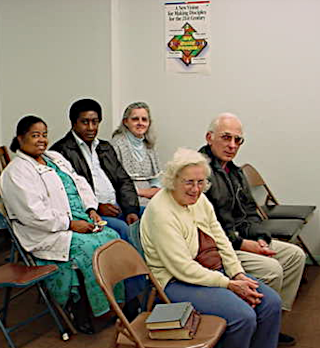
A small group in attendance at a church in Cambridge, Maryland in 2002.
Basic Elements of Christianity
The Church Rev. 0423
The term "church" first appears in the NT and is used interchangeably with the the term "body of Christ" (1Cor. 12:27, Eph. 4:12). In the Holy Scriptures, it never meant a building of wood, stone or other material, but the assembly (another term for church) of all disciples of Christ. It has been said that, "the Church is not the steeple but the people." Such terms can also speak of the universal spiritual membership in Christ, even if not collected in a certain geographical location.

Some would be quick to say we ought not even try to figure out who is a real Christian (or what group is a real Christian fellowship), but there are a number of Holy Scriptures that instruct us otherwise. For example, in the same chapter of Matthew 7 where Jesus told us judge not (verse 1), we also read that he said to beware of false prophets (verse 15). And 1 Cor. 6 shows us that local Church fellowships need to judge at times, and by the Holy Spirit take decisive action against those not truly living in Christ.
The only true Church is the collective group of real, true born-again Christians throughout the world, or in other words, universal. Another term for universal is catholic which must not be confused with Catholic (as in "Roman Catholic Church"). Until Christ Himself returns, the Church cannot be pin-pointed by a group name or locality (Lk. 17:21). Keep in mind Christ Himself said (Mt 18:20), "For where two or three are gathered together in my name, there am I in the midst of them." The gathering does not have to be in a church building, for the building does not make the church— the truly born-again comprise the true Church.
The Church must conduct its matters according the Word of God and direction of the Holy Spirit. It must be careful not to bow to every dictate of human government. For example, while it is reasonable and godly for a local church to submit to a certain safety code, no church should place on their official membership roll a person who would not qualify for the Kingdom of God— even if human government insists they do so. Such a one may attend services provided they properly behave, but no one should be received as an official member of a local church, fellowship, or denomination if they do those things which are indicators of those who will not be counted in the Kingdom of God.
Because the Church must conduct its matters according to the Word of God and direction of the Holy Spirit, it must not be influenced by the world nor by way the world conducts their matters. The Church is to be a theocracy— not a business, social club, political arena or anything else.
One thing that corrupted the Church in the early centuries was politics from human government. The Church essentially duplicated the structure and manner of the human government of its time instead of being governed by the Holy Spirit according to the Word of God.
Accepting the ways of the world is great invitation to sin. History bears record of the sad demise of the Church, being transformed from its once godly and spiritually powerful condition to a shameful low depravity and the forsaking of a number of foundational truths (One thing that occurred was when the nominal church eventually based salvation on human works instead of the finished work of Christ). However, a careful study of history shows that there always remained a number of true disciples of Christ. So, just a few centuries after the last of the original Apostles died “the Church” (the nominal Church) and The Church (the true Church) could be found.
Martyrs Mirror, originally published in Dutch by Thieleman J. van Braght in 1660 in Holland, records much of the history of true Christians who were persecuted (mainly by the nominal Church) down through the centuries to past the time of the Protestant Reformation. This work is in public domain and may be had by downloading from sources on the Internet.
During those centuries after the death of the original Apostles the bishop of Rome eventually became the head of all the churches. However, never in the NT do we ever see one disciple designated as the head. Those familiar with the NT might then ask about Mt. 16:13-19. Here is that passage in Young's Literal Translation (YLT):
Yes, Christ did say to Peter (Mt. 16:19b), "I will give unto thee the keys of the reign of heaven...," but that was in affirmation to the fact he had been open to hearing from the Holy Spirit to say what he did. According to John 20:21-23 all the disciples were to be so led by the Holy Spirit. The keys to the Kingdom of Heaven are hearing the Holy Spirit and being directed by Him. Though Peter was prominent in the early days of the Church, it is clear others like Stephen and Philip also had the keys. We therefore see that the designated head of the universal true Church is Christ Himself, and no one and nothing else (Eph. 4:15).
As of this writing, the United States (U.S.) was based upon democracy in various forms. Often we can vote on people and issues. However the Church is a theocracy. After the outpouring of the Holy Spirit on the Day of Pentecost, all disciples were directed by the Word of God and the Holy Spirit. In the book of Acts, while there were times they had group discussions as what to do, in all cases the group sought the will of God.
However, many fellowships vote in regard to positions in the church and various matters. God, according to His sovereign will, might work in these situations for His purposes. In such cases listen to God and obey Him.
There is a worldwide move by human governments to control local assemblies. This is why some churches are not "registered" with their local governments. This is also one reason why some churches or fellowships are not officially nonprofit in the U.S. and similar nations because, at the time of the creation of this lesson, such a status requires the Christian group to be chartered. The wording of charters and the like often bind those that agree to them to submission to human government. Unlike God, human government changes its rules and can be very oppressive.
Because each person is made in the image of God we serve God when we minister to others as directed by the Spirit. When we minister to others as directed by the Holy Spirit we spiritually edify (build them up). This is a main purpose of attending a local fellowship. It is good to develop the desire to serve instead of being served.
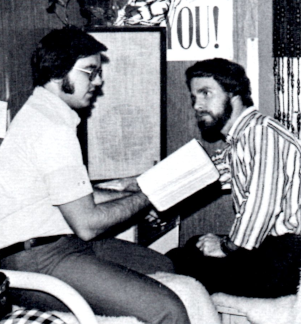
Regardless of what others do, when you enter a fellowship building with other disciples or come upon fellow disciples, determine that you think and speak like Christ. Be a leader and set the pace for purity and reverence. There have been a number of times that I have been grieved when some have entered a sanctuary "before the service starts" and chatter about politics, divorces, the failings of other people and other things of spiritual corruption. No! The service begins the moment two Christians come together. Our minds ought to be focused upon God and serving each other.
Consider well Eph. 4:29, "Let no corrupt communication proceed out of your mouth, but that which is good to the use of edifying, that it may minister grace to the hearers." Also, Co. 3:16, "Let the word of Christ dwell in you richly in all wisdom; teaching and admonishing one another in psalms and hymns and spiritual songs, singing with grace in your hearts to the Lord."
Praying for the needs of others is another vital aspect of the church service. Even if an assembly does not have a time of focused prayer, we can still quietly speak with God about the needs we sense and notice.
We also serve God and others when we bring others to church, help clean the church facility, take care of children, usher, be part of the security detail, and many other possibilities a local church may offer. It is good for a disciple to grow to the point whereby they are able to teach others.
We will cover water baptism in a later lesson, but for this lesson it must be made clear that every born again Christian is part of the true Church, the Body of Christ, whether or not they have been baptized in water.
The term "one Spirit" includes all the activities of the Holy Spirit upon each disciple, one of which is regeneration (Jn. 3:8, Titus / Ti. 3:5). The term also includes what many Pentecostals refer to as "The Baptism Of The Holy Spirit" (Mt. 3:11, Acts 11:6). We have covered the basics of it in a previous lesson, but because this lesson deals specifically with the Church, the Body Of Christ, it will be good for us to see that baptism of the Holy Spirit enables us to supernaturally serve our fellow brothers and sisters in Christ.
Paul by the Holy Spirit refers to the Baptism Of The Holy Spirit when he writes in 1Co. 12:13, "For by one Spirit are we all baptized into one body (The Church), whether we be Jews or Gentiles, whether we be bond or free; and have been all made to drink into one Spirit." The operations and the gifts of the Holy Spirit are mentioned in 1Co. 12. So, considering verse 13, though a person upon true commitment to Christ becomes part of the Church, the Body of Christ, there is the aspect of being Spirit baptized into the Church for supernatural service within the Body Of Christ. 1Co. 12:7 shows that all manisfestations of the Holy Spirit are to profit the members of the Body Of Christ, and verses 12 to 31 show us we are all to work together in the manisfestations given to us in order to bring glory to God and to edify one another.
Christians are to develop the fruit of the Holy Spirit and be used in at least one of the gifts listed in 1 Cor. 12. However, do not feel bad if you are not used in a gift or gifts right away, or if you are unsure what gift or gifts you might have. You will find out as you continue to obediently walk in Christ. There is no Holy Scripture to indicate that a person can be used in only one gift.
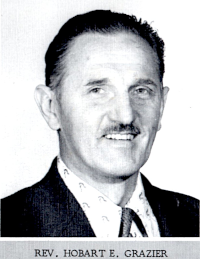 There are true Pentecostals and fake Pentecostals, fellowships that adhere to the Holy Bible teachings of Pentecostalism and fellowships that misrepresent Pentecostalism, and anything else in between! This is one reason among many why each of us should read, study, and learn the Holy Bible.
There are true Pentecostals and fake Pentecostals, fellowships that adhere to the Holy Bible teachings of Pentecostalism and fellowships that misrepresent Pentecostalism, and anything else in between! This is one reason among many why each of us should read, study, and learn the Holy Bible.
Some people think that a Pentecostal church should be a place where anything goes. However, a true Pentecostal fellowship will endeavor to follow the rules of 1Co. 14 when the gifts (charismata) of the Holy Spirit are in operation, and 1 Thess. 5:19 coupled with 1 Co. 14:40 in regard to the gift (dorea) of the Holy Spirit as seen in Acts 2 and 10. Remember what you learned in the lessons The Holy Spirit's Baptism and The Fruit and Gifts of the Spirit, along with the insightful information from my Greek professor, brother Hobart Grazier.
Because all true churches are comprised of Christians who are in various phases of their walk in Christ, from time to time things will happen that ought not to happen.
However, there are groups that apparently think that the Holy Spirit does not care about the written Word of God. I have heard reports of certain Pentecostal / Charismatic meetings where people barked like dogs. I would hardly think this is of God, because in regard to the valid operation of speaking in tongues, Paul writes by the Holy Spirit in 1Co. 14:23, "If therefore the whole church be come together into one place, and all speak with tongues, and there come in those that are unlearned, or unbelievers, will they not say that you are mad (crazy)?" How much more when a bunch of people are barking like dogs?
I have videos of a certain group that have styled themselves as apostles, and their meetings are chaotic. There is even one scene in a video where the main speaker is speaking but you can see a man off to the side encouraging the congregation to be noisy and act wildly. Yet, we read in 1Co. 14:40, "Let all things be done decently and in order."
That does not mean a Pentecostal church must follow a strict order of service. It does mean, however, that a service will be directed by the Holy Spirit and, if so, it will be decent and follow an order that will promote the spiritual edification of the disciples and present the lost with their need of making Christ their King and Savior.
I was blessed when I came to Christ because most of the Pentecostal services I attended were actually led by the Holy Spirit. For example, most times we began service with an opening prayer and began to sing hymns and choruses. While worshiping like that the worship leader or perhaps someone playing an instrument would lead the congregation from one selection to another directed by whatever God placed in their mind. Sometimes at the end of a song most of the congregation would respond to the dorea of the Holy Spirit in vocal praise in tongues, but then the Holy Spirit might move upon a disciple to give a message in tongues and we would expect an interpretation. Sometimes there were prophecies. Sometimes the pastor would call people to the altar for prayer. It is hard to describe except for the fact it was varied at times, was always decent, and had recognizable order.
At the time this lesson was created, some good examples of a decent, God-glorifying Pentecostal Services may be found by listening to one of the recordings of Zion Fellowship International's (ZFI) conventions where a recording features the worship portion of a convention. A current link for a list of their recorded conventions is https://www.zionfellowship.org/media-conventions/ .
Also at the time this lesson was created, ZFI was pretty solid in teaching and preaching. If you are looking for a church to attend there might be a ZFI church in your area. Visit https://www.zionfellowship.org/churches/ .
Do not attend any church unless you know they adhere to sound teaching (doctrine). Do not attend a church that does not plainly indicate what they believe and practice. And a statement that simply says "we believe the Bible" is not good enough. Even some cults will tell you they believe the Bible.
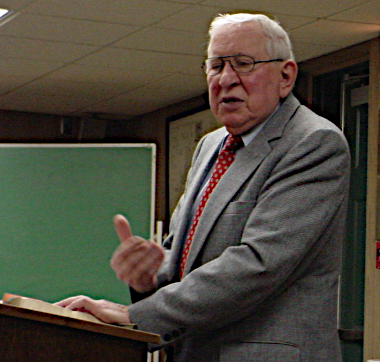 Above is pictured brother John Lichi, who is now with the Lord, delivering a message to a church gathering in the meeting room of the Dorchester County Public Library, Cambridge, Maryland.
Above is pictured brother John Lichi, who is now with the Lord, delivering a message to a church gathering in the meeting room of the Dorchester County Public Library, Cambridge, Maryland.After the original apostles died the focus of a Christian assembly gradually shifted from the written Word to Holy Communion. I am of the opinion that the underlying reason for this shift was because after the original apostles died sin crept more quickly into the Body of Christ and exposure to the written Word often involves our need to deal with our weaknesses and sin. So an instinctive tendency to avoid the written Word increased over the centuries.
Other ways in which attention upon the written Word is diminished or even taken away is an over emphasis upon worship, tongues and prophetic utterances (consider 1Co 14 again), having an experience with God and a few other ways. While what I have just mentioned is good to have and is supported by Holy Scripture, overall, through the ongoing course of meetings, sound Holy Bible preaching and teaching needs to remain in focus.
And, in our times the devil is more subtle. He will see to it that attention is taken away from the written Word of God by replacing it with translations and versions that are not true to the ancient texts. Stay away from a church that teaches translations do not matter.
Churches do hold services such as prayer meetings where the entire meeting is comprised of such an activity. Nevertheless, although no one might be vocally teaching, preaching, or the like, the Word of God ought to be kept in focus in such a way that everything is done in accordance with it.
First, it is helpful to know that even though the Jews were commanded to observe sabbath on the seventh day, in Hebrew1 sabbath essentially means to rest from labor. So, if need be, one can have a sabbath of three consecutive days.
Second, Christ pointed out The Law permitted certain necessary work on the Jewish sabbath (Mt. 12:5), and that specific needs were taken care of on the sabbath (Mt. 12:11, Lk. 13:15).
Third, Christ fulfilled the Jewish Law (Mt. 5:17, Ro. 10:4). In fulfilling the Law Christ set in motion the principles of the Law that directed its followers in His righteousness. Christ gave an example of that in Mt. 5:38-39, "You have heard that it has been said, An eye for an eye, and a tooth for a tooth: 39 But I say to you, That you resist not evil: but whoever shall smite you on your right cheek, turn to him the other also."
The Jewish Law of the sabbath has been fulfilled by Christ. Though we ought to have a specific time to rest unto God from our labors, it does not have to be Saturday or Sunday. In fact, many of the earliest disciples met together for a time on both Saturday and Sunday (The Lord's Day – Re. 1:10).
Many assemblies have additional services throughout the week. Christians who must work on Sundays in needful activities like, but not limited to, medical care and law enforcement might be able to attend a fellowship on their day off.
In cases where a Christian is located somewhere where there is no true Christian fellowship to attend, one can have a sabbath by resting from their labors and spending focused time with Lord Himself.
So, as it is written by the Holy Spirit through the Apostle Paul in Co. 2:16, "Let no man therefore judge you ... in respect of ... the sabbath days."
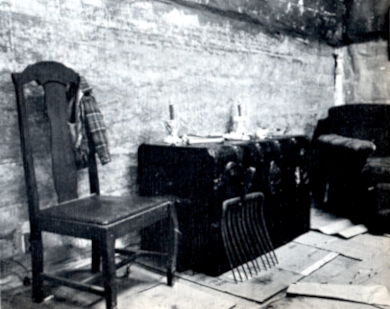
However, it might come to the point, or one might find themselves in a situation, where even two Christians cannot get together. Even now there are disciples isolated in prisons and cannot meet with other Christians. Though this be so, it is good to know that we are spiritual creatures and, since the real Church is in constant operation, we remain in spiritual fellowship with other disciples. Consider what is recorded in Eph. 2:4-6 and 1Co. 5:3-5.
Jesus is recorded as saying in John 9:4, "the night is coming when no one can work." While that might sound hopeless, it actually is not because God will still work even though no man can work. Personally, what I sense from His statement is that when it gets that dark perhaps the only thing we can do is to worship Him, understanding that when we do so we enter into the continuous worship that is before His throne as recorded in Revelation 4 and 5, and is seen before our Savior and Judge Of The Earth opens the seven seals of the scroll that He is able to take (see Revelation 6). You can also intercede in prayer for others and for situations as led by the Holy Spirit, and study the written Word of God.
It may happen that a dark time personally for you is being confined to a nursing home, rehabilitation center, hospital, prison, and the like. As a true Christian, you can always serve God and be in His presence as just mentioned in the previous paragraph. You can meditate upon the Word of God if you cannot read the Holy Bible or have it read to you in some way. You always have value to God and can be used for His purposes.
Time to take a quiz (in English only).
Notes:
1 Wilson, William: "Wilson's Old Testament Word Studies" (MacDonald Publishing: McLean, VA;) p364
Lesson Menu
View the Glossary
Go to the Index
Abbreviations and about Reference Notations